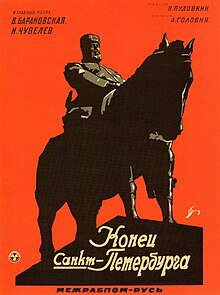The End of St. Petersburg
| The End of St. Petersburg | |
|---|---|
 |
|
| Directed by |
Vsevolod Pudovkin Mikhail Doller |
| Written by | Nathan Zarkhi |
| Starring |
Aleksandr Chistiakov Vera Baranovskaia Ivan Chuvelev V. Obolenskii |
| Cinematography | Anatoli Golovnya |
| Distributed by | Mezhrabpom |
|
Release date
|
|
|
Running time
|
87 min. (Kino DVD edition) |
| Country | Soviet Union |
| Language |
Silent film Russian intertitles |
The End of St. Petersburg (Russian: Конец Санкт-Петербурга, translit. Konets Sankt-Peterburga) is a 1927 silent film directed by Vsevolod Pudovkin and produced by Mezhrabpom. Commissioned to commemorate the tenth anniversary of the October Revolution, The End of St Petersburg was to be one of Pudovkin's most famous films and secured his place as one of the foremost Soviet montage film directors.
The film forms part of Pudovkin's 'revolutionary trilogy', alongside Mother (1926) and Storm Over Asia (aka The Heir to Genghis Khan) (1928).
The End of St. Petersburg is a political film, explaining why and how the Bolsheviks came to power in 1917. The film covers the period from about 1913 to 1917. The film does not show the political figures of the time; the emphasis is on the struggle of ordinary people for their rights and for peace against the power of capital and the autocracy.
The film inspired the composer Vernon Duke to write his eponymous oratorio (completed in 1937).
A simple peasant boy arrives in St. Petersburg to obtain employment. Fate leads him to a factory where there are severe, almost slave-like working conditions. The erstwhile farmer barely gets by, understanding that to live this way is actually impossible. The desire to improve the situation forces him to take part in a major revolt of the workers, but as a result of this the lad goes to prison. A real school of life waits for him there, other prisoners obsessed with the idea of reforming Tsarist Russia infect the peasant with their bold ideas. When leaving prison, the young man is among the first to raise their banners against the king and to go and storm the Winter Palace.
...
Wikipedia
